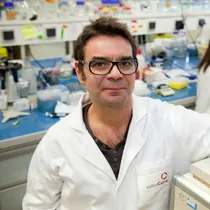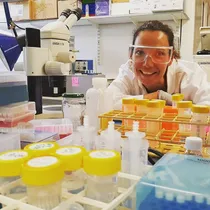- Accueil >
- Publications >
- RAF proteins exert both specific and compensatory functions during tumour progression of NRAS-driven melanoma
RAF proteins exert both specific and compensatory functions during tumour progression of NRAS-driven melanoma
Auteurs
Coralie Dorard, Charlène Estrada, Céline Barbotin, Magalie Larcher, Alexandra Garancher, Jessy Leloup, Friedrich Beermann, Manuela Baccarini, Celio Pouponnot, Lionel Larue, Alain Eychène, Sabine Druillennec
Résumé
Abstract
NRAS and its effector BRAF are frequently mutated in melanoma. Paradoxically, CRAF but not BRAF was shown to be critical for various RAS-driven cancers, raising the question of the role of RAF proteins in NRAS-induced melanoma. Here, using conditional ablation of
Equipes


Membres

CELIO POUPONNOT
Directeur de recherche CNRS
LIONEL LARUE
Directeur de recherche Inserm

